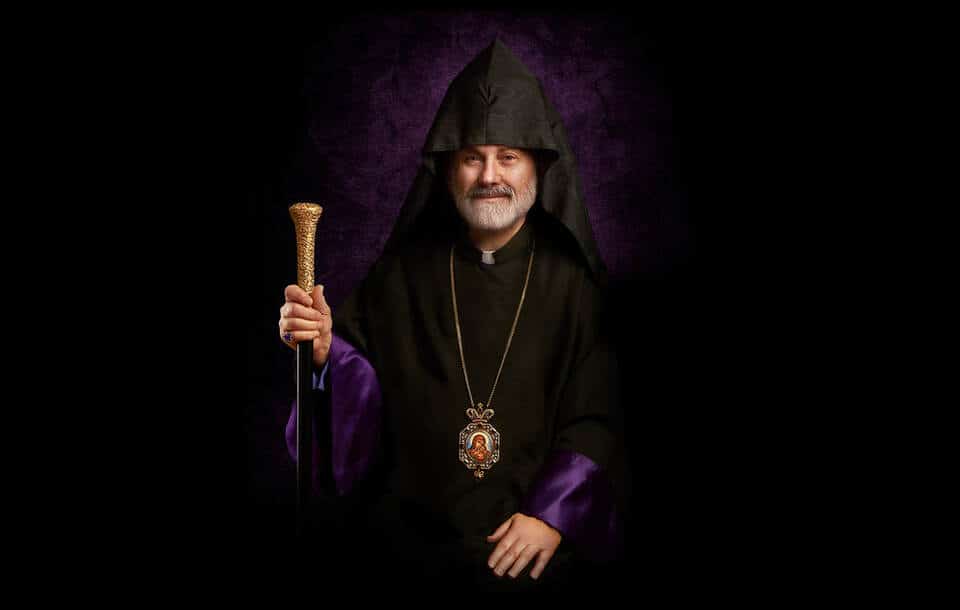The Prelate’s Sermon, December 6
Today, the third Sunday of Advent, the reading of the Gospel is from St. Luke. Our Lord Jesus Christ one day being invited to a dinner, talks about the Christian perspective of inviting guests. Upon the exclamation of one of those who was sharing the table, that “Blessed is anyone who will eat bread in the kingdom of God,” Jesus tells the parable of a banquet, where the invitees for different reasons have declined their attendance and the housemaster makes a new decision with new participants (Lk 14:12-24). The far more ancient Armenian text of the Gospel lesson does not use the word “bread,” but rather uses the familiar word to all of us, “jash,” which means “the midday meal.” In other words, “Blessed is he who will dine at the midday meal in the kingdom of God.” This is not insignificant to the Armenians because we are invited every Sunday to be participants in the Holy Banquet of the Badarak, and the Badarak commences with the “Jashou Bashdon,” which is to say, the liturgical service of the great Midday Meal for all of Christianity.
Our Lord Jesus Christ regularly refers to common and to familiar things when He is describing the Kingdom of God so that people may understand the metaphor. He refers to a mustard seed (Lk 13.18-19), to yeast for making bread (Lk 13:20-21), and to little children who grasp the innocence (Lk 18:16) of a hidden treasure (Mt 13.44); of a businessman (Mt 13.45); of a fisherman’s net (Mt 13.47); of a king (Mt 18.23; 22.2); of a landowner (Mt 20.1); and of ten maidens (Mt 25:1). He even employs irony when saying that it is easier for a camel to go through the eye of a needle than for a rich man to enter into the Kingdom of God (Lk 18:25). Then, at the Last Supper, He blessed and gave the wine to His disciples saying, “I shall not drink of the fruit of the vine until the Kingdom of God shall come” (Lk 22:18).
This method of introducing a new concept by referring to familiar experiences is indeed the best way to acquaint the listener and to convince the listener of the positive effect. St. Paul used the same approach when in Athens he referred to the altar of the “unknown god” to lay the groundwork of commonality (Acts 17:23). As a matter of fact, in our daily life, consciously or unconsciously, we follow the same pattern when we like to share our views or experiences with our fellow human beings.
A lunch, a dinner or a banquet has a unique character. Besides physical nourishment, there are social, intellectual, and spiritual dimensions. The educational factor is obvious. We learn many new things from fashions to ideas, programs, insights, etc. By using the metaphor of a banquet, Jesus wished to emphasize that we are all invited to a joyous eternal gathering. Regardless of our merits, God is the Initiator, the Planner, and the ultimate Decision Maker.
Our use of will plays an important role in either welcoming the invitation to dine in the Kingdom of God, or to be deprived of its immense benefits due to our poor judgment. Yes, our knowledge of the magnitude of the favor and of the privilege is crucial. Unfortunately, for different reasons, we may decline to participate in an event, and later when we become aware of its unique success, we feel sorry and reproach ourselves for having declined the invitation. There are many reasons to welcome or to deny an offer. To make it more relevant, we know that modern media makes tremendous effort, real or fake, to commercialize any event or merchandise in order to create interest and attract our curiosity and response. We may hear or read many comments in this regard, yet our experience, our knowledge, and our judgment follow the trust in the reliability of the given source and direct us in making our decision.
Creation, which was intended and designed to be good, unfortunately for reasons fully not comprehensible to us, is often obstructed in its purpose, though without deviating from its ultimate goal. St. John refers to this tragedy in a simple yet profound description of the relationship between the Creator and Creation: “He was in the world, and the world came into being through Him; yet the world did not know Him” (Jn 1:10). By eliminating all the aspects about which non-believers might create doubt, the three pillars (no one can deny the reliability of our Source about them) are (1) the prophecies throughout ages about Jesus of Nazareth, (2) His solid, earthly life, including teaching and works, and (3) the adherence to Him by millions of His followers.
And lo! This phenomenal Person, Teacher, Wonder Maker, is promising and inviting us to eternal joyous ecstasy. As beings privileged with physical, intellectual, and spiritual gifts, our earthly life is the only opportunity given to us to follow either this worldliness or to be attentive to its Creator. The choice is ours. The free invitation, full of love and mercy, is directed to all, regardless of our merits. The Heavenly Banquet will be continued for ever with us or without us. Our faith, combined with knowledge, should come with a judgment not to perpetual regret as described by our Lord Jesus Christ with “weeping and gnashing of teeth” (Lk 13:28), but for eternal bliss.
As the children of light, let us make the right choice, and eternally praise the Giver of all good for ever. Amen.

